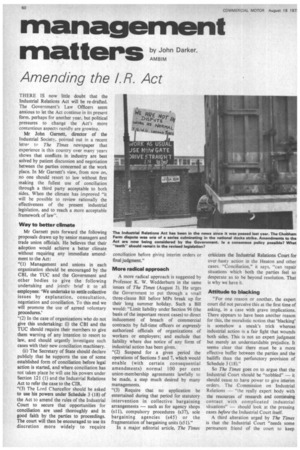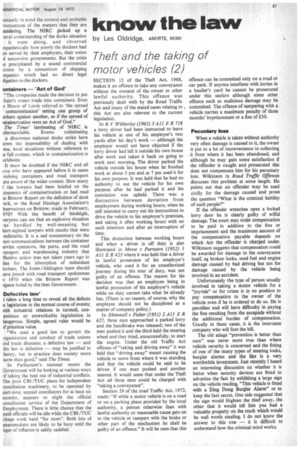management matters
Page 52

Page 53

If you've noticed an error in this article please click here to report it so we can fix it.
by John Darker, AMBIM
Amending the I. R. Act
THERE IS now little doubt that the Industrial Relations Act will be re-drafted. The Government's Law Officers seem anxious to let the Act continue in its present form, perhaps for another year, but political pressures to change the Act's more contentious aspects rapidly are growing.
Mr John Garnett, director of the Industrial Society, pointed out in a recent lever to The Times newspaper that experience is this country over many years shows that conflicts in industry are best solved by patient discussion and negotiation between the parties concerned at the work place. In Mr Garnett's view, from now on, no one should resort to law without first making the fullest use of conciliation through a third party acceptable to both sides. When the climate has improved "it will be possible to review rationally the effectiveness of the present industrial .legislation, and to reach a more acceptable framework of law".
Way to better climate
Mr Garnett puts forward the following proposals drawn up by senior managers and trade union officials. He believes that their adoption would achieve a better climate without requiring any immediate amendment to the Act: "(1) Management and unions in each organization should be encouraged by the CBI, the TUC and the Government and other bodies to give the following undertaking and jointly brief it to all employees: 'We undertake to settle collective issues by explanation, consultation, negotiation and conciliation. To this end we will promote the use of agreed voluntary procedures.'
"(2) In the case of organizations who do not give this undertaking: (i) the CBI and the TUC should require their members to give them warning of any intention to resort to law, and should urgently investigate such cases with their new conciliation machinery.
(ii) The Secretary of State should declare publicly that he supports the use of some established form of conciliation before legal action is started, and where conciliation has not taken place he will use his powers under Section 121(1) and the Industrial Relations Act to refer the case to the CIR.
"(3) The Lord Chancellor should be asked to use his powers under Schedule 3 (18) of the Act to amend the rules of the Industrial Court to secure that opportunities for conciliation are used thoroughly and in good faith by the parties to proceedings. The court will then be encouraged to use its discretion more widely to require conciliation before giving interim orders or final judgment."
More radical approach A more radical approach is suggested by Professor K. W. Wedderburn in the same issues of The Times (August 3). He urges the Government to put through a small three-clause Bill before MPs break up for their long summer holiday. Such a Bill would: "Limit liability under Section 96 (the basis of the important recent cases) to direct inducement of breach of commercial contracts by full-time officers or expressly authorized officials of organizations of workers or employers; and exclude that liability where due notice of any form of industrial action has been given.
"(2) Suspend for a given period the operations of Sections 5 and 7, which would enable (with certain consequential amendments) normal 100 per cent union-membership agreements lawfully to be made, a step much desired by many managements.
"(3) Require that no application be entertained during that period for statutory intervention in collective bargaining arrangements — such as for agency shops (s11), compulsory procedures (s37), sole bargaining agencies (s45) or the fragmentation of bargaining units (s51)."
In a major editorial article, The Times
criticizes the Industrial Relations Court for over-hasty action in the Heaton and other cases. "Conciliation," it says, "can repair situations which both the parties feel so desperate as to be beyond resolution. That is why we have it.
Attitude to blacking "For one reason or another, the expert court did not perceive this at the first time of asking, in a case with grave implications. There appears to have been another reason for this, the moralistic notion that 'blacking' is somehow a sneak's trick whereas industrial action is a fair fight that wounds both sides. This is not an expert judgment but merely an understandable prejudice. It seems clear that there must be a more effective buffer between the parties and the bailiffs than the perfunctory provision of Schedule 3 (18)."
So The Times goes on to argue that the Industrial Court should be "nobbled" — it should cease to have power to give interim orders. The Commission on Industrial Relations — -the really expert body with the resources of research and continuing contact with complicated industrial situations" — should look at the pressing cases before the Industrial Court itself.
A third alteration urged by The Times is that the Industrial Court "needs some permanent friend of the court to keep
nstantly in mind the context and probable nsequences of the matters that they are nsidering. The NIRC picked up a teral understanding of the docks situation it went along, and observed rnpathetically how poorly the dockers had en served by their employers, 'their union
d successive governments. But the crisis is precipitated by a sound commercial cision by a consortium of shipping mpanies which had no direct legal ,ligation to the dockers.
containers — 'Act of God' "The companies made the decision to put -itain's ocean trade into containers. Even e House of Lords referred to 'the spread containerization' setting one group of orkers against another, as if the spread of intainerization were an Act of God." The Times' lambasting of NIRC is
Klerstandable. Events culminating a disastrous national docks strike have town the impossibility of dealing with nse, local situations without reference to le full context, which in containerization is orldwide.
It must be doubted if the NIRC and all use who have appeared before it in cases .volving containers and road transport ere aware of the wider context. How many I the lawyers had been briefed on the onomics of containerization or had read ie Bristow Report on the definition of dock 'ork, or the Road Haulage Association's bservations on Bristow, made in February, 970? With the benefit of hindsight, veryone can see that an explosive situation as handled by well-meaning but hort-sighted lawyers with results that were redictable. It is a sad commentary on the oor communications between the container ervice operators, the ports, and the road ransport and warehousing industry that ffective action was not taken years ago to Ilan for the absorption of redundant lockers. The Jones /Aldington team should lave joined with road transport spokesmen ri 1970 when ' the Bristow Report was )igeon-holed by the then Government.
Defective law' t takes a long time to reveal all the defects n legislation in the normal course of events; vith industrial relations in turmoil, conentious or unworkable legislation is Jangerous. Simple, agreed rules would be )f priceless value.
"We need a good law to govern the vganization and conduct of trade unions ind trade disputes; a defective law — and his law is defective -may be justified in .heory, but in practice does society more iarm than good," said The Times.
In Parliament's summer recess the Government will be looking at various ways pf taking the heat out of industrial conflicts. The joint CBI /TUC plans for independent zonciliation machinery, to be operated by part-time, unpaid conciliators for at least six months, appears to slight the official conciliation service of the Department_ of Employment. There is little chance that the paid officials will be idle while the CBI /TUC chaps work hard "for nowt". Both lots of peacemakers are likely to be busy until the tiger of inflation is safely saddled.


































































































